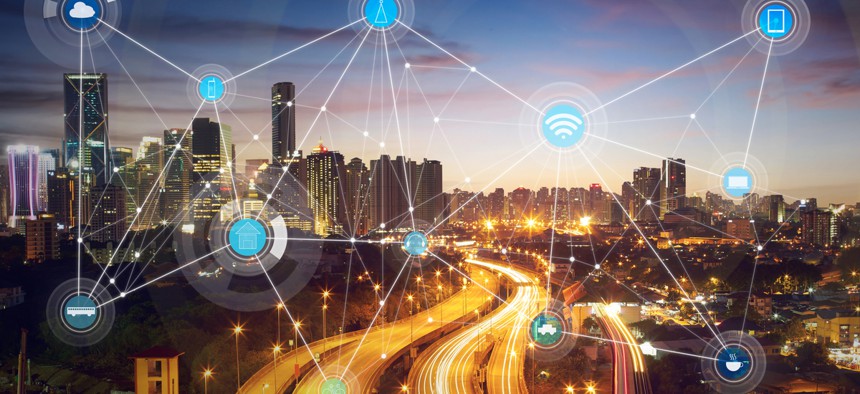Commission Wants to Know If China’s Smart Cities Are Smarter than Ours

jamesteohart/shutterstock
The U.S.-China Commission wants to look at how Chinese smart cities development plans could affect U.S. economic and national security.
A Congressional commission set up to look at the technical and economic threat posed by China is soliciting a report on a different kind of threat vector: the development of smart cities.
The U.S.-China Economic and Security Review Commission—established by Congress in 2000—is looking for a contractor to prepare a report on China’s development policies for smart cities, including the kinds of technology and infrastructure the country is focused on.
The report should answer a number of questions about how China plans to develop communities around information and communications technologies that can be integrated into daily life, as well as the impact on its people and economy and those of the U.S. Some specific questions include:
- What specific policy plans have the central, provincial and local governments developed to foster smart cities?
- What key attributes are Chinese smart cities expected to contain and what role are smart cities expected to play in China's development strategies?
- How do smart cities align with China's domestic security, industrial policy and foreign policy objectives?
- In which smart city technologies and applications has China gained an edge in development and deployment, and how?
- How should the U.S. government and U.S. Congress mitigate the security and privacy risks and improve U.S. economic competitiveness in smart cities?
The report should focus on the technologies at play, including “5G, cloud computing, big data, artificial intelligence and blockchain,” as well as how the government uses those technologies for mass surveillance, according to the request for proposals. The analysis will drill down into how those technologies are being funded and developed—in or out of China, with or without government input and support—and how successful those efforts have been to date.
Conversely, the report should examine how Chinese-made technologies and products are being used to build smart cities in America and any potential security risks that might introduce.
While most of the commission’s work focuses on more traditionally defined threats and outward economic challenges, the technologies concerned and economic impact of infrastructure improvements are well within its scope.
Unless otherwise negotiated before a contract is signed, the project is expected to take about five months. The commission’s standard practice is to allow 90 days for the researchers to submit a draft report, 30 days for its members to respond and another 30 days for revisions before the final submission.
The RFP also warns of the commission’s insistence on quality. If the final report contains typos or doesn’t match the Chicago Manual of Style, the contractor will have five days to fix all errors. If errors remain, the commission will hand the report over to a copy editor at the cost of $40 per hour, which will be deducted from the contractor’s pay.
Bids must be submitted—in person or by email—by 5 p.m. Feb. 20.






